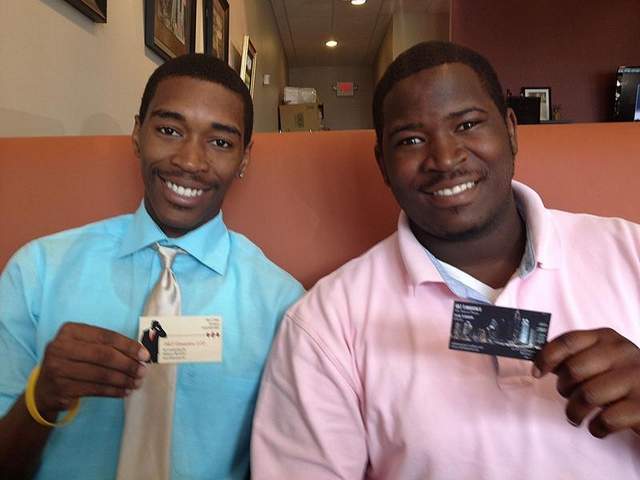
Monday, September 24, 2012
umes students are emerging entrepreneurs
By Deborah Gates. Daily Times Staff Writer
SALISBURY – Tyere Ferguson noticed right away that the long, rural expanse of the Eastern Shore would create a challenge for his college classmates without cars. He had one. And it wasn’t long before Ferguson was hauling students at the University of Maryland Eastern Shore who didn’t.
The hustle earned him the nickname “Taxi Ty.” It also stuffed his bank account with an extra $7,200 to pay expenses for his freshman year at the college in Princess Anne. In July, he and brother Aliyu Dabo, both UMES seniors, launched A&T Limousines LLC, which offers transportation “in style and fashion” to students.
Their 14-seat Lincoln Town car is a fleet away from their vision of multiple cars to serve the multimillion-dollar market of college students. It also is a far stretch from the four-seat sedan that Taxi Ty drove into town five years ago.
The brothers are among a steady stream of enterprising college students creating a business niche in an unstable jobs market. A noticeable change is the attitude among student entrepreneurs whose business plans are taking a more conservative approach in an uncertain economy.
“Since the financial meltdown, students are more concerned before jumping into being an entrepreneur,” said Stephen Adams, associate professor of management in the Perdue School of Business at Salisbury University. “They are not less likely to start a business, but rather, the scope of what they are trying to do is a little bit scaled down.
“The spirit of entrepreneurship is alive and well; what has changed is the attitude about risk,” Adams said.
Dabo had a spirit of entrepreneurship since he was 10, when he began tinkering with his mother’s desktop computer she used for the family’s bus company. “I got a virus on her computer, and I found out how to fix it,” he recalled. “I started taking computers apart, trying to fix them. Then I got into building computers. I always wanted to be in business.”
Young entrepreneurs
Ferguson, too, was enterprising as a youngster, influenced he said by the transportation company his mother started and a similar business started years before by her father. He learned well that a business must be prepared to accommodate swift growth. “I’d bring Gatorade to school to sell to the high-school football team,” he recalled. “I had to hire three people, business was so good, and we sold Gatorade, candy and sticky buns.”
While a survey by the National Association of Colleges and Employers found that companies plan to hire 10 percent more new graduates this year than last, another study in February by the Pew Research Center showed a mere 54 percent of 18- to- 24-years were employed, the lowest rate since 1948.
The average age of entrepreneurs who start a business is mid-30s, and the most successful rate has been among those between mid-40s and mid-50s, Adams said. Students who go into the corporate work world have time to consider self-enterprise, he said.
“Many of them don’t do it right away, and often it takes having experience, contacts and resources,” Adams said. “Students can get priceless advice from professionals in business about funding a start-up.”
For a decade, he directed the annual Bernstein Achievement Award for Excellence, which annually recognizes outstanding student achievement in preparing a business plan. Students are realistic enough to know that iconic success without a solid college education and training is not likely.
The Bernstein competition awards a top prize of $50,000 to the student with a winning business plan. During the 25 years of the competition, at least half the student winners have gone on to launch their own business, he said. The most successful ones are those who earn a college diploma, Adams said.
“All students know Bill Gates, Steve Jobs and Mark Zuckerberg,” he said, referring to the founders or co-founders of Microsoft, Apple Computers and Facebook, respectively.
“The three of them are college dropouts, but they are the exceptions. There is a strong positive correlation to getting a degree and being a successful entrepreneur.”
“Think outside the box”
Writing a business plan for a nonprofit fundraising initiative and marketing the event helped position Prescilla Velez for a job as an event planner at a Salisbury company. The 2012 SU graduate starts the new job this week. As a college senior, she organized a fundraiser that would launch a competitive scholarship fund for Worcester County high school art students. The initiative taught her to develop a business plan and lean toward nonprofit agency work as an optional career path. For the initiative, she raised $1,635 through “Bill’s Bash,” a nonprofit initiative named for her friend. a Worcester County artist who died of cancer.
“I like to think outside the box, and when I was looking for a community service project idea for a class project, I decided to do that; the scholarship fund was Bill’s dream,” she said. “College students are not automatically driven to start a business. The idea is to get an education and then go out and find a job. Starting a business is a huge leap.”
Dabo, 20, and Ferguson, 23, registered their limousine business with the state of Maryland. They park the 14-seater at a garage in Baltimore, and students can go online to reserve it. Eventually, they plan to bring that and other cars to the Eastern Shore.
“Medical, transportation and food services are always in demand,” Ferguson said. “People always will need somewhere to go, something to eat and someone to care for them. We take the approach that people will always need transportation.”
This article was published Sept. 23, 2012 by The Daily Times, Salisbury, MD and is reprinted here with the newspaper’s permission.

